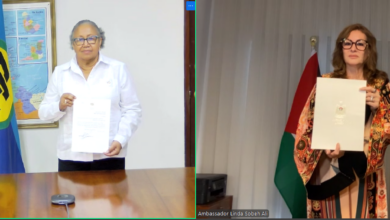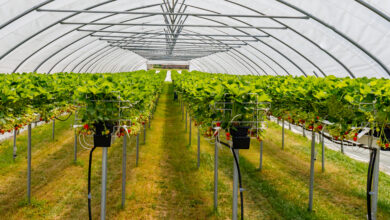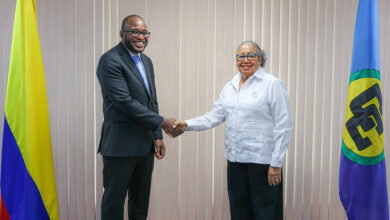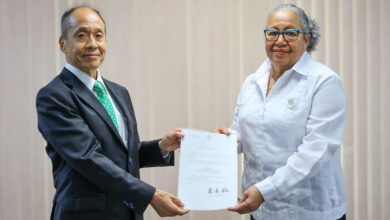Salutation
The Caribbean Renewable Energy Development Programme represents one of two areas of activity in the field of energy currently being undertaken by the CARICOM Secretariat. The other area is the formulation of a regional energy policy by a Task Force on Regional Energy Policy, which was established in 2003 in Port of Spain by the 14th Inter-sessional Meeting of the Conference of Heads of Government of CARICOM.
The proposed regional policy will fully consider all forms of energy, and will seek to optimise the supply, pricing, storage, and transportation of energy within the region, within the context of the Caribbean Single Market and Economy. A key part of the policy will be the appropriate utilisation of indigenous sources of renewable energy. While this recent re-commitment by the Heads of Government comes some 4 years after the early preparatory work for the Caribbean Renewable Energy Development Programme, the work of the Task Force will ensure that renewable energy is solidly place within the context of the wider energy picture.
In January 2002, the CARICOM Secretariat assumed the mantle of leadership for the Caribbean Renewable Energy Development Programme, and soon established a Project Management Unit for the Programme in July of that year. The charge of the Project Management Unit was to prepare the Programme for full implementation in accordance with the requirements of the funding agency, the Global Environment Facility as well as the United Nations Development Programme. This effort built on the earlier work by the Caribbean Energy Information System and important regional stakeholders including Government Ministries, the University of the West Indies, the Caribbean Development Bank, the Association of Caribbean Electric Utilities, and the Caribbean Solar Energy Society. We are pleased to say that our efforts have now been successful, and this Inception Workshop marks the beginning of the full implementation of the Programme.
The CARICOM Secretariat sees the Caribbean Renewable Energy Development Programme as yet another example of successful cooperation with our partners at the United National Development Programme. We are indebted to them for their guidance in the preparation of the Programme, and in mobilising an additional US$3.726 million of grant funding from the Global Environment Facility. We are also indebted to the German Aid Agency, GTZ, for providing US$2.2 million in grants; the Secretariat will be executing an agreement with our German Counterparts for this very shortly.
The Secretariat also wishes to acknowledge the contributions of our regional partners to the Programme. Of special mention is the Global Sustainable Energy Island Initiative, a consortium spear-headed by the Organisation of American States, which will make in-kind contributions of US$500,000. This contribution, together with the contributions of 13 participating countries present at today's workshop, brings the total in-kind contribution to over US$5 million. The Secretariat is therefore gratified by the strong demonstration of support by our partners across the region.
The implementation of this Programme comes at a time when, as recently as Friday 7 May, the world oil prices reached their highest level in more than 30 years at US$40 per barrel. This event reminds us of the need, if we needed reminding, for small open societies such as ours to minimise the adverse impact that exorbitant oil prices will continue to have on our vulnerable economies.
If we needed to further underscore the importance of this Programme, we have only to look at the fact that over-dependence on energy from fossil fuels contributes to global warming through the emission of carbon dioxides and other harmful greenhouse gases. While the total impact of our carbon dioxide emission remains small in the grand scheme of things, we are still committed to leadership in the field of renewable energy and sustainable development, especially as it relates to climate change. In this regard, all of the member states of CARICOM are signatories to the United Nations Framework Convention on Climate Change (UNFCCC) and to the Kyoto Protocol. Such international agreements provide a facilitating framework under which the region may achieve its goal of 10% renewable energy market share by the year 2010.
Achievement of this goal is a great challenge as petroleum products currently account for an estimated 93 percent of commercial energy consumption in the Caribbean. Should this situation continue, renewable energy is likely to provide less than 2% of commercial electricity by 2015. Furthermore, average electricity prices in our region are as much as 7 times higher than those in the United States and Europe. The challenge of this workshop is, therefore, to propose concrete ways in which to lessen the burden of our oil consumption habits, while reducing our production of harmful green house gases.
There is a treasure at the end of the rainbow, as our region is blessed with an abundant supply of clean, renewable energy resources. However, as we all know, resource wealth has never been a precursor to success, since, to date, our exploitation of renewable energy has lagged far behind its potential. This fact is recognised by the Caribbean Renewable Energy Development Programme; we believe that the exploitation of our valuable indigenous resources is hindered by market barriers such as: the lack of appropriate policies, legislation and regulations; the lack of appropriately prepared bankable projects and financing; limited human capacity; and the general lack of awareness about the technologies and benefits of renewable energy.
Given these challenges, the overall objective of Caribbean Renewable Energy Development Programme is: “to remove barriers to the increased use of renewable energies and reduce implementation costs, thus reducing the Caribbean region's dependence on fossil fuels and contributing to the reduction of green house gas emissions.”
I am pleased to note that during this workshop participants will be exploring the practical aspects of these issues. The ultimate success of the Programme depends on the stakeholders' taking ownership and responsibility for its inputs and outputs. We look forward to this workshop contributing to the enhancement of the work plan for the Programme during the next two days. However, your commitment must not end there. Your commitment must extend throughout the duration of the Programme over the next 4 years. We look forward to your continued support, and I hope that during your deliberations, ideas will emerge on how the battle may be won to reduce dependence on oil, save on electricity costs, and save the global environment.
It is therefore my pleasure to wish you a successful Inception Workshop for the Caribbean Renewable Energy Development Programme.





